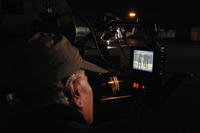The U.S. Army has not ordered the Corps of Engineers to allow construction of the Dakota Access Pipeline to proceed under a disputed Missouri River crossing, despite what North Dakota Sen. John Hoeven told The Associated Press.
Hoeven announced late Tuesday that Acting Secretary of the Army Robert Speer had directed the Army Corps of Engineers to "proceed" with an easement necessary to complete the pipeline, the AP reported. Hoeven said he also spoke with Vice President Mike Pence, just a week after President Donald Trump signed an executive order signaling his support for the project.
However, Maj. Gen Malcolm Frost, chief of Army Public Affairs, released the following statement on Wednesday:
"The Army has initiated the steps outlined in the January 24th Presidential Directive which directs the Acting Secretary of the Army to expeditiously review requests for approvals to construct and operate the Dakota Access Pipeline in compliance with the law," Frost said. "These initial steps do not mean the easement has been approved.
"The Assistant Secretary for the Army Civil Works will make a decision on the pipeline once a full review and analysis is completed in accordance with the directive."
This is the latest twist in a months-long legal battle over the $3.8 billion project.
The crossing under Lake Oahe, a wide section of the Missouri River in southern North Dakota, is the final big chunk of work on the four-state pipeline to carry North Dakota oil through South Dakota and Iowa to Illinois.
The pipeline has been the target of months of protests led by Standing Rock Sioux tribe members, whose reservation lies near the pipeline's route and who have argued that it's a threat to their water supply.
The tribe has vowed to challenge any granting of the easement in court, and Chairman Dave Archambault renewed that vow Tuesday night.
"If it does become a done deal in the next few days, we'll take it to the judicial system," Archambault said. He added, "This is a good indicator of what this country is going to be up against in the next four years. So America has to brace itself."
The developer, Texas-based Energy Transfer Partners, said the pipeline would be safe.
An environmental assessment conducted last year determined the crossing would not have a significant impact on the environment. However, then-Assistant Army Secretary for Civil Works Jo-Ellen Darcy on Dec. 4 declined to issue an easement, saying a broader environmental study was warranted in the wake of opposition by the Standing Rock Sioux.
Energy Transfer Partners called Darcy's decision politically motivated and accused then-President Barack Obama's administration of delaying the matter until he left office. Two days before he left the White House, the Corps launched a study of the crossing that could take up to two years to complete.
Trump on Jan. 24 -- just four days after he took office -- signed an executive action telling the Corps to quickly reconsider the Dec. 4 decision.
Energy Transfer Partners appears poised to begin drilling under the lake immediately. Workers have already drilled entry and exit holes for the Oahe crossing, and the company has put oil in the pipeline leading up to the lake in anticipation of finishing the project, its executive vice president, Joey Mahmoud, said in court documents filed earlier this month.
Hundreds, and at times thousands, of pipeline opponents who dubbed themselves "water protectors" have camped on federal land near the crossing site since August, often clashing with police and prompting more than 625 arrests.
The camp's population has thinned to fewer than 300 due to harsh winter weather and a plea by Archambault for the camp to disband before the spring flooding season.
-- Matthew Cox can be reached at matthew.cox@military.com.































